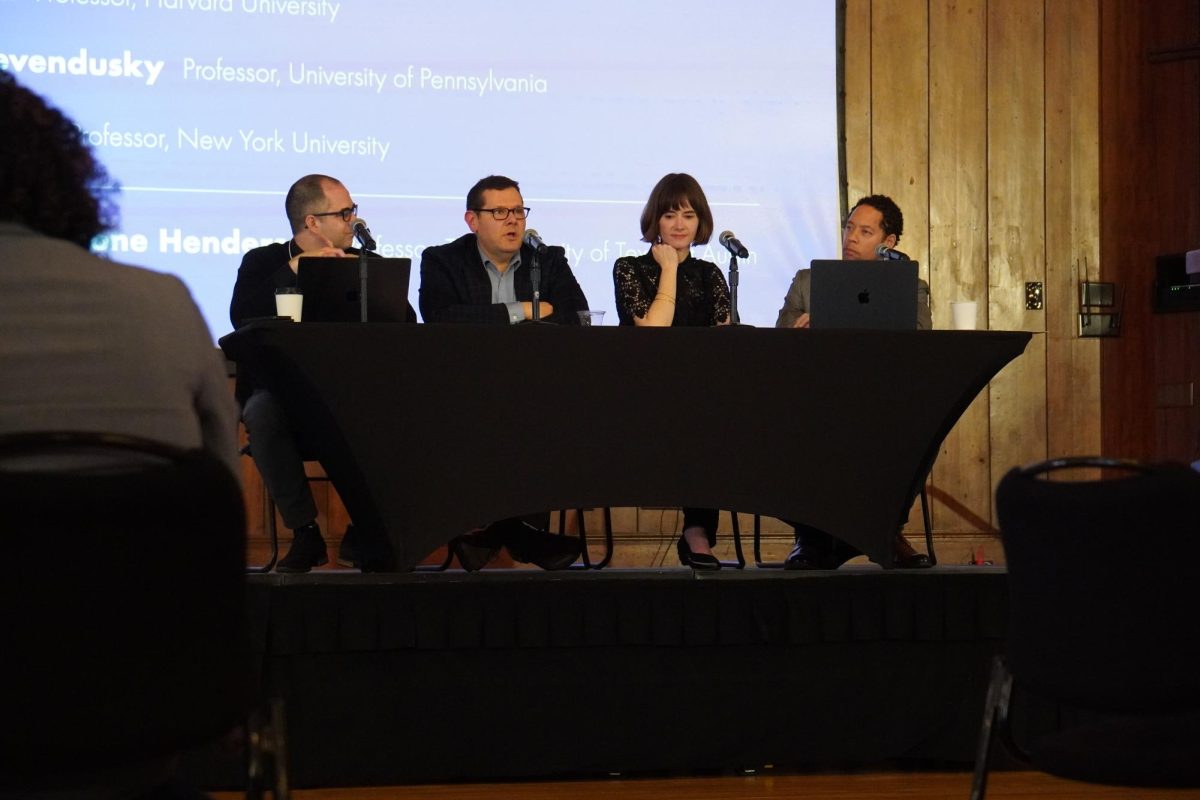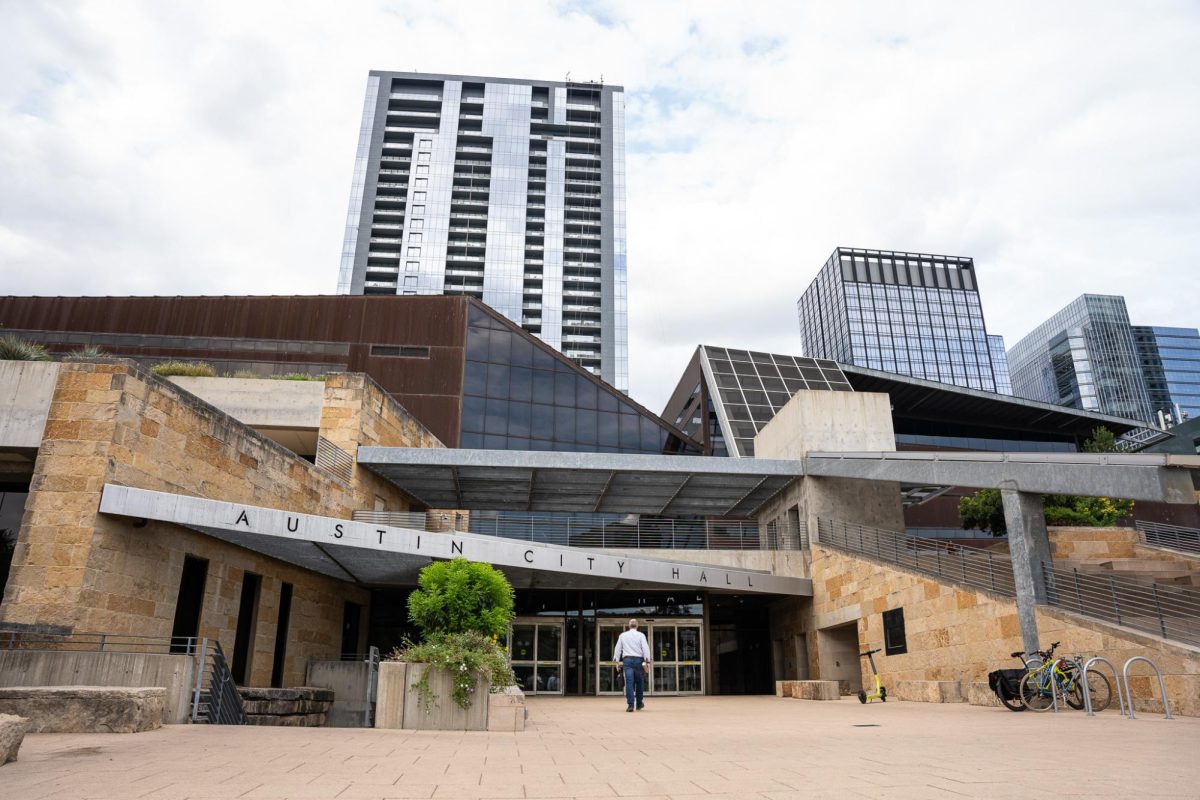Educators and law experts discussed religious freedom, meritocracy and higher education as it relates to democratic societies at “Discourse In Action, Theory, and Democracy” on March 7.
Religion in free societies
Eric McDaniel, a UT government professor, moderated the panel “Religion in Free Societies” where panelists discussed religious freedom within the United States. Panelists included Steven Collis, a UT law professor; Sahar Aziz, a Rutgers Law School professor; and Andrew Lewis, an associate political science professor at the University of Cincinnati.
Collis said religious freedom is an ongoing effort of adjusting laws to allow diverse religious communities to coexist.
“There is a significant gap between the theory of religious freedom and how it’s actually put into practice,” Collis said.
Aziz said a person’s race and adherence to a particular religion can impact their ability to experience religious freedom, influencing religious pluralism within a society. Religious pluralism is the unity of different religions in a society.
“A white Mormon experiences religious freedom differently than an Arab Muslim, even though they are both religious minorities,” Aziz said. “We need to explore how that Mormon is raised as white and how that Muslim is raised as non-white when we’re trying to understand how they experience religious freedom.”
Lewis said religious freedom is essential within a democratic society and its government.
“It’s increasingly challenging in a polarized world when one core liberty is tied to a particular party, and we have strong views about parties,” Lewis said.
Does meritocracy exist?
Richard Reeves, a social scientist and president of the American Institute for Boys and Men, spoke with Yasmiyn Irizarry, an associate professor in the Department of African and African Diaspora Studies at UT.
The panel discussed meritocracy as a political and social philosophy, and its implications on a free society. Irizarry said students learn the idea of meritocracy as a contest, but don’t fully understand what it is — they just know that it matters.
“If I ask (students), ‘how do we define it?,’ often the definitions end up using the very words,” Irizarry said.
Irizarry’s son, who went to the Liberal Arts and Science Academy, wasn’t in the top 5%, but was accepted into UT on his own. He was one of a small number of Black students in the high school. She said her son was excited that he was admitted, but his achievement was not celebrated because of stigmas about his race.
“He told his friends, and they said to him, ‘of course you did, you’re Black,’” Irizarry said. “And it was like in that moment, all the work he had done, all the test scores, it all disappeared.”
Reeves said he found it interesting that people born into wealth attribute their success to meritocracy.
“In the U.S., the class reproduction machine operates under the camouflage of meritocracy and class success,” Reeves said. “Born on third base, thinking (the country) did a triple and, guilt-free, hogging their tax breaks, opposing school integration policies and change.”
Reeves said society should value people for more than just their economic contributions and shouldn’t judge people only using economic terms.
“That’s the line we draw — you don’t have to abandon meritocracy,” Reeves said. “We just don’t want it to be the main lens through which we view each other.”
Who are the real elite?
Three authors — Kristen Soltis Anderson, William Deresiewicz and Michael Lind — discussed the growing skepticism of the elite in a panel moderated by Daniel Oppenheimer, director of public affairs for the College of Liberal Arts.
The panelists began by defining the elites as those who hold economic power, not just money.
“It seems like we live in a moment where all the threads of power and influence are gathered into smaller hands,” Deresiewicz said.
Deresiewicz said the elite has shifted from a generally liberal group into a fiscally conservative majority.
“We seem to be in the middle of the replacement of … the liberal elite with a very different elite,” he said. “It’s not a situation where groups are seeking gained admission to an existing elite, but rather an insurgency that seeks to destroy the existing elite.”
Lind said the elite’s shift to the political right is not surprising.
“They were never really Democrats in the first place. They’re not really Republicans now, but the momentum is with the Republicans, so they’re going to be on that team,” Lind said.
Anderson said that the elite must act with humility to be taken seriously, citing its widespread mistrust of the Centers for Disease Control and Prevention during the COVID-19 pandemic.
“(The elites) have to be comfortable knowing that there are lots of things (they) don’t know, and be humble in (their) pronouncements about what (they) do,” Anderson said. “I wonder if it’s possible to have an elite that is a little more humble.”
Sticks and stones — why is it so hard to disagree?
Professors Mina Cikara from Harvard University; Matthew Levendusky from the University of Pennsylvania; and Jay Van Bavel from New York University, discussed how it has become difficult to have civil disagreements and possible solutions.
“A key aspect of our mission as teachers and researchers is to prepare students to be successful in life,” said UT liberal arts professor Marlone Henderson, who moderated the discussion. “Given the ever-increasing divisiveness that exists in society, some argue that we as educators could be doing a better job at fulfilling our mission.”
Henderson asked panelists if moral divisiveness has become more recent.
“I think anytime moral issues are on the table, we have the potential to get incredibly heated because the easiest explanation for why we don’t think the same things is that (an opponent is) immoral,” Cikara said. “We stop at the concept of their beliefs, and don’t necessarily interrogate how they came to hold those beliefs in the first place.”
Panelists also discussed potential solutions to this problem.
“One of the benefits of growing older is that you realize that you will screw up, and that you will need people to forgive you, so in return, you would send them that same courtesy,” Levendusky said.
Panelists also discussed if the concept of truth has been eroded because of the rise of social media, and if people can come to agreements if truth does not exist.
“Ideally, it would be great if we had a deeper understanding of people and their differences in order to respect them, embrace some of the things that we can agree on and enrich our own thinking,” Van Bavel said.
What is the purpose of education in a democratic society?
Universities exist to solve problems for democracy, but the status of universities in democracy is under threat, said Joy Connolly, president of the American Council of Learned Societies.
Connolly’s keynote lecture was moderated by professor Pauline Strong, director of Native American and Indigenous Studies. It aimed to answer the purpose of higher education in a democratic society.
“We’re in a battle over the university, its purpose and its future,” Connolly said.
This battle reflects the measuring of the value of university degrees by a post-graduate job salary, and the rise of the internet and misinformation, Connolly said. She said higher education, which was once viewed as an “engine of social mobility,” is experiencing backlash from federal and state lawmakers.
“We have a chance to bring the university into closer alignment with the democracy that it seems to foster,” Connolly said.
Connolly said universities should reflect the plurality of the human experience through the study and distribution of knowledge and communicate with people outside of academia. She said universities must continue to study humanities subjects like language, history and psychology.
“The university is here to equip us to manage our plurality,” Connolly said. “By studying ourselves and our world, by connecting with and understanding one another as people.”
Connolly said tearing down walls between universities and other areas of society by communicating their findings in diverse ways can help solve polarization in democracy.
“Above all, we need to cultivate care for the world, past, present and future,” Connolly said. “We need to do this work together to preserve freedom for everyone.”














